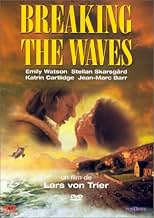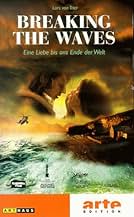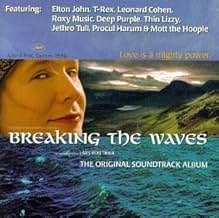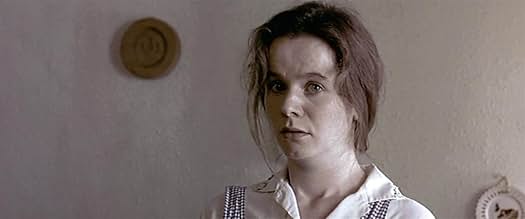एक दुर्घटना में तेलमैन जान को लकवा मार जाता है। उनकी पत्नी, जिसने उसकी वापसी के लिए प्रार्थना की, अपने आप को कसूरवार मानती है; उस वक़्त और भी ज़्यादा, जब जान उसे दूसरे के साथ यौन संबंध बनाने... सभी पढ़ेंएक दुर्घटना में तेलमैन जान को लकवा मार जाता है। उनकी पत्नी, जिसने उसकी वापसी के लिए प्रार्थना की, अपने आप को कसूरवार मानती है; उस वक़्त और भी ज़्यादा, जब जान उसे दूसरे के साथ यौन संबंध बनाने के लिए ज़ोर देता है।एक दुर्घटना में तेलमैन जान को लकवा मार जाता है। उनकी पत्नी, जिसने उसकी वापसी के लिए प्रार्थना की, अपने आप को कसूरवार मानती है; उस वक़्त और भी ज़्यादा, जब जान उसे दूसरे के साथ यौन संबंध बनाने के लिए ज़ोर देता है।
- निर्देशक
- लेखक
- स्टार
- 1 ऑस्कर के लिए नामांकित
- 45 जीत और कुल 28 नामांकन
Finlay Welsh
- Coroner
- (as Finley Welsh)
फ़ीचर्ड समीक्षाएं
The first time I saw Breaking the Waves, I was astonished that Emily Watson had not acted for the cinema before her turn as Bess McNeill. What she brings to the role of the naive Scottish girl offers a clinic on superlative acting that could humble veterans with ten times the experience. Another thing that makes this film so special is that it never backs away from its vivid and mature examination of love, commitment, and aspects of the metaphysical. I easily class this work as one of the top films of the 1990s. Director Lars von Trier is a true visionary, and the (largely hand-held) cinematography by Robby Muller perfectly defines the tone of the film -- in fact, the theatre where I saw Breaking the Waves posted a disclaimer that warned anyone who suffers from motion or sea-sickness to see the film at their own peril!
There had not been a lot of movies I'd seen in a very long time, where the act of embracing one's faith in a greater power, and an unselfish, all-encompassing belief in unconditional love and trust were so vividly and powerfully portrayed. CROUCHING TIGER, HIDDEN DRAGON so invests its characters with these traits, that I thought I would never see another film to rival it in this respect. I was sadly mistaken.
Neither Emily Watson or Stellan Skarsgard are as conventionally attractive as the kind of actors you would find in a big budget Hollywood production. Yet in their love scenes as Jan and Bess, I believe we get our very first glimpse on film of what sex between two people is meant to be as the Man Upstairs intended; not something dirty or vile or wanton, or anything as icily clinical as the conditions prescribed by Mother Church, but as a gift to us to be enjoyed, and therefore in turn the greatest gift that any one person can give to another as a sign of love and affection. That alone makes Skarsgard and Watson two of the sexiest, most passionate actors ever to make love on screen; they invest that much into Jan and Bess. I very nearly cried when Bess tells Jan in the throes of passion "Thank you." So deep, tender and uncalculating is her love for him, that he can't help but return it. Few of us will ever know a love of that capacity or intensity in our lifetimes.
Which is what makes this film's conceit easier to accept, and that much harder to bear. In these hard and cynical times, it would be easy to dismiss Bess as a feeble-minded idiot and have done with it. Had director Von Trier seen her story in that way, this would've been a pretty short film.
But when our love for another and our faith is all we have, no matter how misguided it is, no one has the right to question or debunk it, no matter how well-meaning they are. I don't think that Bess' fate could've been altered or avoided no matter how her husband's doctor, her mother, or her sister-in-law Dodo had tried to approach the situation. Her love for Jan and her faith in God are what simultaneously nourished, sustained, uplifted and destroyed her. At the end, she was afraid that maybe she had made a mistake investing herself in making the ultimate sacrifice, and maybe that's what Von Trier was trying to say with that ending, which I'm sure turned off a lot of viewers. If the sacrifices you make are in quest of such love and spirituality, then you can never be wrong.
That's a heady message, and a dangerous one if it is taken out of context. But for those who would condemn this film, I can only say this: you're not paying attention. BREAKING THE WAVES is a film about a woman fallen into promiscuity, the same way that BOOGIE NIGHTS is about a bunch of sleazy pornographers. If you're only looking at the surface, you shouldn't be questioning the content, but your own lack of vision.
Neither Emily Watson or Stellan Skarsgard are as conventionally attractive as the kind of actors you would find in a big budget Hollywood production. Yet in their love scenes as Jan and Bess, I believe we get our very first glimpse on film of what sex between two people is meant to be as the Man Upstairs intended; not something dirty or vile or wanton, or anything as icily clinical as the conditions prescribed by Mother Church, but as a gift to us to be enjoyed, and therefore in turn the greatest gift that any one person can give to another as a sign of love and affection. That alone makes Skarsgard and Watson two of the sexiest, most passionate actors ever to make love on screen; they invest that much into Jan and Bess. I very nearly cried when Bess tells Jan in the throes of passion "Thank you." So deep, tender and uncalculating is her love for him, that he can't help but return it. Few of us will ever know a love of that capacity or intensity in our lifetimes.
Which is what makes this film's conceit easier to accept, and that much harder to bear. In these hard and cynical times, it would be easy to dismiss Bess as a feeble-minded idiot and have done with it. Had director Von Trier seen her story in that way, this would've been a pretty short film.
But when our love for another and our faith is all we have, no matter how misguided it is, no one has the right to question or debunk it, no matter how well-meaning they are. I don't think that Bess' fate could've been altered or avoided no matter how her husband's doctor, her mother, or her sister-in-law Dodo had tried to approach the situation. Her love for Jan and her faith in God are what simultaneously nourished, sustained, uplifted and destroyed her. At the end, she was afraid that maybe she had made a mistake investing herself in making the ultimate sacrifice, and maybe that's what Von Trier was trying to say with that ending, which I'm sure turned off a lot of viewers. If the sacrifices you make are in quest of such love and spirituality, then you can never be wrong.
That's a heady message, and a dangerous one if it is taken out of context. But for those who would condemn this film, I can only say this: you're not paying attention. BREAKING THE WAVES is a film about a woman fallen into promiscuity, the same way that BOOGIE NIGHTS is about a bunch of sleazy pornographers. If you're only looking at the surface, you shouldn't be questioning the content, but your own lack of vision.
This is the story about love. Everyday we experience this breathtaking emotion with both inanimate objects and with other souls. It is when we finally find true love that nothing else in the world seems worthy or good. We work as hard as we can to continue this warmth that we feel in our hearts when true love exists, and sometimes that means going to a level we never thought imaginable.
That is the central theme of Lars von Trier's epic, Breaking the Waves. Love has no boundaries as we watch Bess do everything possible (and more) to keep the relationship with her husband together during the roughest of times. Emily Watson controls the character Bess giving her best performance ever. The emotion and serenity that is felt, not only behind the character of Bess, but also behind Watson's eyes is phenomenal. It is not often that Hollywood is able to capture this sort of raw emotion, but Watson pulled it off with incredible talent.
Outside of Watson's character, there is the story. Lars von Trier does a spectacular job of continually building on the foundation that he has begun.
Watson is his foundation, and Trier builds this amazing world around her. In this film, everything from talking to God to reverberating stories to her husband while he is in the hospital only helps build the story to even higher heights. I will be honest; I shed tears at the end of this film. It will pull at every heart muscle that you have and really make you look at your significant other and truly feel the power of love.
This is a love story, but not like one we have seen in a very long time. I don't think we will see anything similar to this again. It will be hard for Hollywood to emulate such raw talent, groundbreaking direction, and life-changing story.
Thank you Lars von Trier for your imagination and passion for love.
Grade: ***** out of *****
That is the central theme of Lars von Trier's epic, Breaking the Waves. Love has no boundaries as we watch Bess do everything possible (and more) to keep the relationship with her husband together during the roughest of times. Emily Watson controls the character Bess giving her best performance ever. The emotion and serenity that is felt, not only behind the character of Bess, but also behind Watson's eyes is phenomenal. It is not often that Hollywood is able to capture this sort of raw emotion, but Watson pulled it off with incredible talent.
Outside of Watson's character, there is the story. Lars von Trier does a spectacular job of continually building on the foundation that he has begun.
Watson is his foundation, and Trier builds this amazing world around her. In this film, everything from talking to God to reverberating stories to her husband while he is in the hospital only helps build the story to even higher heights. I will be honest; I shed tears at the end of this film. It will pull at every heart muscle that you have and really make you look at your significant other and truly feel the power of love.
This is a love story, but not like one we have seen in a very long time. I don't think we will see anything similar to this again. It will be hard for Hollywood to emulate such raw talent, groundbreaking direction, and life-changing story.
Thank you Lars von Trier for your imagination and passion for love.
Grade: ***** out of *****
It's a pity that for most people Lars von Trier's involvement with the Dogme group of film makers is the main thing they know about him. Wherever you stand on the Dogme issue (personally I'm all for it as long as they continue to make movies as great as 'Festen' and 'The Idiots'), his brief alliance with the group has overshadowed amazing work like 'Element Of Crime', 'Europa' and 'Breaking The Waves'. 'Breaking The Waves' was made before the Dogme manifesto was formulated, but it can be seen as a step in that direction, with its use of documentary techniques as opposed to the flamboyant and highly stylized approach of von Trier's earlier films. To me the ends justifies the means, and the bottom line is that this is an extraordinary and powerful movie, one of the greatest of the last ten years. The main reason it is so remarkable is because of the devastating performance of Emily Watson, one of the most impressive screen debuts in the history of film. Watson plays Bess McNeill, a naive and odd young woman living in a remote and deeply religious Scottish community. She is so good in this movie she'll leave you speechless! Stellan Skarsgard, a most underrated actor in my opinion,('Insomnia', 'Ronin') plays Bess's husband and is also superb, and the supporting cast includes the late Katrin Cartlidge ('Naked') as Watson's sister-in-law, and von Trier regulars Jean-Marc Barr (almost unrecognizable from his leading role in 'Europa'), as one of Skarsgard's work buddies, and cult legend Udo Kier ('Flesh For Frankenstein', 'The Story Of O') in a cameo as a very nasty piece of work who Bess has the misfortune to encounter. The less you know about this movie the more powerful it will be, and even a jaded cynic like myself was surprised at how effective its spiritual theme was. To me 'Breaking The Waves' is a much better more than von Trier's better known 'Dancer In The Dark', and Watson's performance makes Bjork's look like that of an enthusiastic but not very talented amateur (which of course, is exactly what she is). Highly recommended.
Emotional power is one of the most difficult and complex aspects of film-making to succeed in. Very few films can manage to be emotionally destructive, while still retaining the viewer's concentration and dedication to the piece. Yet, Breaking the Waves is a film that holds more emotionally power that most films, it is not a film you will want to see again. One viewing is enough (at least for a long period of time). Bearing in mind, you will feel devastated by the film's self-destructive nature and after viewing such an unforgettable story of heart ache and sadness you will have etched into the back of your mind.
Breaking the Waves is a complicated story; it is one that studies love, regret, guilt, madness and religion. Breaking the Waves is set in a small religious town deep in Scotland and tells the sorrowful story of the innocent Bess (Emily Watson) and her lover Jan (Stellan Skarsgaard). Jan becomes paralysed in a freak accident at the oil-rig he is working on and asks his estranged wife Bess to have sex with other men and then tell him what it was like to keep their relationship stable.
Lars Von Trier, the founder of Dogme film-making creates a drama that remains in a league of its own. Though Breaking the Waves is not Dogme film-making (like The Idiots) it still has elements of Dogme film-making style littered around it. The film is separated into chapters, which work as wonderful mood and symbolic transitions. These sequences are a single shot focusing on something that is considerably impressive, with the added touch of a brilliantly chosen song to fit the mood. The film's general direction is one that feels like it has been shot with a hand-held style.
The film studies many questionable elements of life, including topics such as death, terminal illness, spirituality, emotions and hypocrisy in religion. These are just a view of the talking points that crop up throughout the long running-time. The film asks the viewer questions and most importantly tests how much harrowing devastation you can handle. There is no denying just how pure Breaking the Waves is.
Emma Watson gives a career defining performance with her pitiful role of a naive young woman, who just wants to be free from pain. The performance is very painful to watch because it is so unbearably realistic. You become apart of her journey and watch her emotions and sanity spiral out of control, even from the people who love her. Heartbreaking in every way.
Breaking the Waves is a difficult film and one that is not for everyone, though I say it is a film which deserves the critical acclaim it gets.
Breaking the Waves is a complicated story; it is one that studies love, regret, guilt, madness and religion. Breaking the Waves is set in a small religious town deep in Scotland and tells the sorrowful story of the innocent Bess (Emily Watson) and her lover Jan (Stellan Skarsgaard). Jan becomes paralysed in a freak accident at the oil-rig he is working on and asks his estranged wife Bess to have sex with other men and then tell him what it was like to keep their relationship stable.
Lars Von Trier, the founder of Dogme film-making creates a drama that remains in a league of its own. Though Breaking the Waves is not Dogme film-making (like The Idiots) it still has elements of Dogme film-making style littered around it. The film is separated into chapters, which work as wonderful mood and symbolic transitions. These sequences are a single shot focusing on something that is considerably impressive, with the added touch of a brilliantly chosen song to fit the mood. The film's general direction is one that feels like it has been shot with a hand-held style.
The film studies many questionable elements of life, including topics such as death, terminal illness, spirituality, emotions and hypocrisy in religion. These are just a view of the talking points that crop up throughout the long running-time. The film asks the viewer questions and most importantly tests how much harrowing devastation you can handle. There is no denying just how pure Breaking the Waves is.
Emma Watson gives a career defining performance with her pitiful role of a naive young woman, who just wants to be free from pain. The performance is very painful to watch because it is so unbearably realistic. You become apart of her journey and watch her emotions and sanity spiral out of control, even from the people who love her. Heartbreaking in every way.
Breaking the Waves is a difficult film and one that is not for everyone, though I say it is a film which deserves the critical acclaim it gets.
क्या आपको पता है
- ट्रिवियाTheatrical film debut of Emily Watson. She received an Oscar nomination and was expelled from the School of Economic Science (the alleged cult she was brought up in) for her role in this film.
- गूफ़The film is set in the early 1970s, but the van featured prominently in the car park and heliport scenes is a mid-1980s Freight Rover 200, formerly known as the Leyland Sherpa.
- भाव
Dodo McNeill: Not one of you has the right to consign Bess to hell!
- इसके अलावा अन्य वर्जनThe director's cut of the film, featuring explicit shots removed from the U.S. version for ratings purposes, is available on Criterion laserdisc.
टॉप पसंद
रेटिंग देने के लिए साइन-इन करें और वैयक्तिकृत सुझावों के लिए वॉचलिस्ट करें
विवरण
- रिलीज़ की तारीख़
- कंट्री ऑफ़ ओरिजिन
- भाषा
- इस रूप में भी जाना जाता है
- Rompiendo las olas
- फ़िल्माने की जगहें
- उत्पादन कंपनियां
- IMDbPro पर और कंपनी क्रेडिट देखें
बॉक्स ऑफ़िस
- बजट
- DKK 4,20,00,000(अनुमानित)
- US और कनाडा में सकल
- $38,03,298
- दुनिया भर में सकल
- $38,31,182
- चलने की अवधि2 घंटे 33 मिनट
- रंग
- ध्वनि मिश्रण
- पक्ष अनुपात
- 2.35 : 1
इस पेज में योगदान दें
किसी बदलाव का सुझाव दें या अनुपलब्ध कॉन्टेंट जोड़ें






























